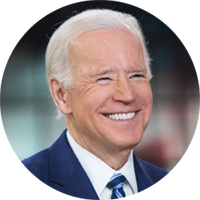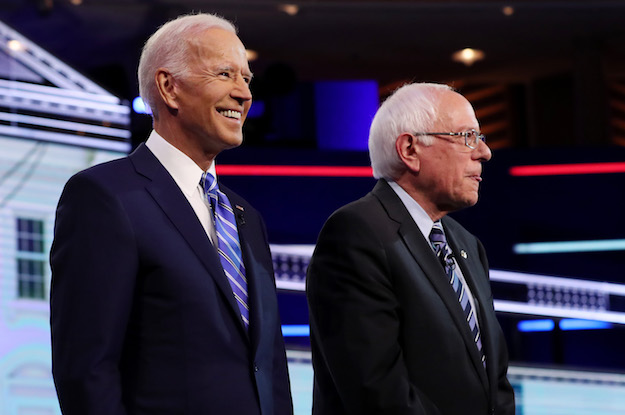Leer en español | Ler em português
This article was updated on October 29
How would a Joe Biden administration approach Latin America? The Democratic presidential candidate responded in March to AQ’s 10-question survey.
AQ reached out repeatedly to President Donald Trump’s team to answer the survey, but did not receive a response.
See Biden’s answers below.
Q1. What is the first Latin American country you would visit after the inauguration?
 |
Biden: As Vice President, I had the good fortune to travel widely throughout Latin America and I have many deep friendships in the region, but it would be presumptuous to announce a visit without checking with the host. However, I will plan to hold an early meeting with Mexican President Andrés Manuel López Obrador to develop a joint economic and security strategy and start delivering on my commitment to undo Trump’s inhumane immigration policies. |
|
Q2. Should the U.S. work to broker a regime change in Venezuela?
 |
Biden: The United States should not be in the business of regime change. Nicolás Maduro is a dictator, plain and simple, but the overriding goal in Venezuela must be to press for a democratic outcome through free and fair elections, and to help the Venezuelan people rebuild their country. The international community also has a responsibility to help Venezuela’s neighbors like Colombia to manage the grave humanitarian crisis created by the millions of Venezuelan migrants who’ve fled the country. As president, I would also grant Temporary Protected Status to Venezuelans in the United States. |
|
|
Q3. Should aid for Northern Triangle countries – El Salvador, Guatemala and Honduras – be contingent on their governments’ ability to stem U.S.-bound migration?
 |
Biden: Our assistance is not a reward, but a way for the United States to help Northern Triangle countries address the violence and poverty that drive desperate families north. Assistance to these countries is in our national interest, but I will also require that governments make concrete commitments to combat corruption, invest their own resources, and demonstrate political will to undertake important reforms. |
|
|
Q4. Are you in favor of negotiating new free trade agreements with Latin American countries, such as Brazil?
 |
Biden: Any new trade deal would need to meet my top priorities of creating U.S. jobs, protecting American workers, and ensuring labor and environmental concerns were a core part of the negotiation. Our current free trade agreements in Latin America – and globally – must be implemented fairly so that they create jobs and shared prosperity for all sides. |
|
|
Q5. How would you ensure credible commitments to fighting corruption from Latin America’s private and public sectors?
 |
Biden: Under my presidency, the United States, including our diplomats and law enforcement agencies, will again lead on anti-corruption, as any effort to improve conditions in the region must start with combating systemic corruption and abuses of power. Unfortunately, the Trump administration has reversed efforts to fight corruption in the region. I will support regional and country-specific efforts to strengthen judicial systems and the rule of law, and will make use of the visa ban and our federal laws to go after corrupt individuals and organizations. |
|
|
Q6. Is China’s growing influence in Latin America a threat to U.S. national security?
 |
Biden: It is the current absence of American leadership in the Western Hemisphere that is the primary threat to U.S. national security. Russia and China can’t match our extraordinary ties and common history with the people of Latin America and the Caribbean. They should be on notice that Trump’s incompetence and neglect in Latin America and the Caribbean will end on Day 1 of my administration. |
|
|
Q7. Do you think a move by Latin American governments to legalize marijuana or other drugs would undermine U.S. interests?
 |
Biden:I support treating marijuana and other drugs as a public health issue. However, I do not believe legalization is a panacea, nor will it address the poor rule of law and weak judicial institutions that allow drug trafficking organizations to thrive in parts of Latin America and the Caribbean. |
|
|
Q8. Should the U.S. take action against Brazil if it fails to protect the Amazon rainforest?
 |
Biden: The fires that ravaged the Amazon last summer were devastating and provoked global action to stop the destruction and support reforestation before it’s too late. President Bolsonaro should know that if Brazil fails to be a responsible custodian of the Amazon rainforest, then my administration will rally the world to ensure the environment is protected. |
|
|
Q9. What is your vision for relations between the U.S. and Cuba?
 |
Biden: Americans – and especially Cuban-Americans – can be our best ambassadors for freedom in Cuba. Therefore, as president, I will promptly reverse the failed Trump policies that have inflicted harm on the Cuban people and done nothing to advance democracy and human rights. |
|
|
Q10. In the 20th century, the U.S. supported coups in countries including Brazil, Chile and Guatemala. As president, would you consider officially apologizing for such past actions?
 |
Biden: The Obama-Biden administration recognized that the United States and Latin America should neither hide from our history nor be constrained by it – and indeed we made great progress in healing wounds from the Cold War in countries ranging from El Salvador, to Argentina, to Cuba. My administration will commit to being the most transparent in history, and will declassify documents from past decades related to U.S policy in Latin America. |
|
|








